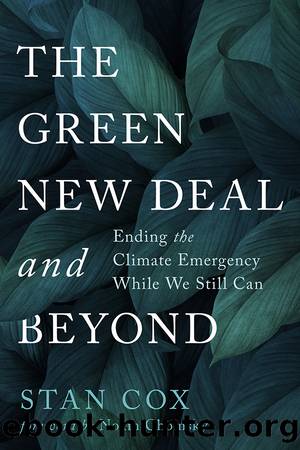The Green New Deal and Beyond by Cox Stan; Chomsky Noam;

Author:Cox, Stan; Chomsky, Noam;
Language: eng
Format: epub
Publisher: City Lights Publishers
4
OFF-RAMP AHEAD
âScience shows we have barely 10 years to avoid disaster, suggesting we shouldnât count entirely on technological innovation or self-moderation. Meanwhile, weâre all in a lifeboat with just enough space for each of us. Should we really be complaining about not getting first-class seats if doing so would bump others?â
âEleanor Boyle, 2019225
Somedayâand it had better be soonâAmericans will mobilize to prevent the ecological catastrophe that is being forecast by scientists. Despite the overwhelming evidence that immediate action is demanded, most people in this country donât seem prepared to do that yet. Politicians and pro-corporate economists are stuck in an endless loop, rejecting ideas for climate action because of their potential short-term impact on profit instead of their long-term capacity to create a stable, sustainable, and just society. We canât limit the array of actions under consideration to those that appear to be politically and economically achievable under current conditions. If it turns out that existing institutions are unable to accept or support the policies and actions that are essential to addressing ecological meltdown, then it is those institutions, not the necessary actions, that need to be overhauled.
The U.S. economy will always be recalcitrant to any form of restraint, but political acceptability is a moving target. The past few yearsâ climate news alone has demonstrated the whiplash speed with which public consciousness can shift. The growing awareness now has to be expanded dramatically, and that will require a blunt, forthright discussion of how profoundly our nation is going to have to change in the hot and increasingly unstable decades ahead.
GOING ON AN ENERGY DIET
If fossil fuels are rapidly eliminated during the transition to non-fossil energy, the pool of energy available to society will shrink. How much it shrinks will depend on how fast the new energy capacity and a new electric grid can be developed. And if the transition succeeds, the handy liquid fuels that for a century have powered road travel, farming, freight hauling, and air travel will be flushed out of society forever. Operating buildings, transportation, and industry mostly on electricity will be much more complicated. But adapting to a leaner energy diet does not have to be a grim ordeal; in fact, it will provide opportunities to scale back the environmental and societal damage that potent, portable energy sources, especially liquid fuels, have empowered us to inflict.
The United States can reduce its energy consumption by first starving the harmful and wasteful parts of the economy that should have been curtailed already on other grounds. The cutting can start in the U.S. military, which produces more greenhouse emissions than most entire countries doâa huge quantity of it from jet fuel.226 The cuts should extend to demilitarizing law enforcement and abolishing mass incarceration. We can slash the energy allowance of the nationâs most affluent people, who account for a disproportionate share of energy consumption and emissions; by one estimate, households having more than $1 million in investment assets are contaminating the Earthâs atmosphere with ten times more greenhouse emissions than the average household.
Download
This site does not store any files on its server. We only index and link to content provided by other sites. Please contact the content providers to delete copyright contents if any and email us, we'll remove relevant links or contents immediately.
| Anthropology | Archaeology |
| Philosophy | Politics & Government |
| Social Sciences | Sociology |
| Women's Studies |
Cecilia; Or, Memoirs of an Heiress — Volume 1 by Fanny Burney(31332)
Cecilia; Or, Memoirs of an Heiress — Volume 3 by Fanny Burney(30934)
Cecilia; Or, Memoirs of an Heiress — Volume 2 by Fanny Burney(30889)
The Great Music City by Andrea Baker(21313)
We're Going to Need More Wine by Gabrielle Union(18072)
Bombshells: Glamour Girls of a Lifetime by Sullivan Steve(13108)
Pimp by Iceberg Slim(12931)
All the Missing Girls by Megan Miranda(12747)
Fifty Shades Freed by E L James(12451)
Norse Mythology by Gaiman Neil(11883)
Talking to Strangers by Malcolm Gladwell(11876)
Crazy Rich Asians by Kevin Kwan(8349)
Mindhunter: Inside the FBI's Elite Serial Crime Unit by John E. Douglas & Mark Olshaker(7834)
The Lost Art of Listening by Michael P. Nichols(6472)
Enlightenment Now: The Case for Reason, Science, Humanism, and Progress by Steven Pinker(6405)
Bad Blood by John Carreyrou(5769)
The Four Agreements by Don Miguel Ruiz(5511)
Weapons of Math Destruction by Cathy O'Neil(5036)
We Need to Talk by Celeste Headlee(4868)
